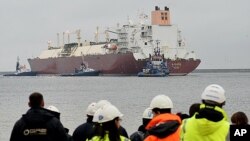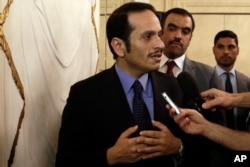Qatar has announced plans to sharply increase its natural gas production, a move that could be seen as preparation for a protracted dispute with its Gulf neighbors.
State-owned Qatar Petroleum said Tuesday that it would boost its production of liquefied natural gas (LNG) by 30 percent over the next few years. Most of the increased production will come from the North Field, the world's biggest natural gas field, which Qatar and Iran are developing.
In the background of Tuesday's energy announcement was a looming deadline for Qatar to comply with a series of demands by Saudi Arabia, the United Arab Emirates and Egypt, the three leading states among those that broke off diplomatic and commercial ties with Qatar a month ago.
The Saudis and their partners claim Qatar is supporting terrorism in an alliance with Iran. They have demanded that the Doha government downgrade its relations with Tehran, shut down the state-owned broadcaster Al Jazeera and order closure of a Turkish military unit stationed in Qatar. The Arab states' ultimatum to Qatar did not mention the large military base the United States has in the Gulf state.
Qatar disavows terrorism
Qatar's rejection of the Saudi demands is expected, but it has not yet been made public. Kuwait, which has been acting as a mediator in the monthlong dispute, said it received a written response from Doha on Monday, but officials in the UAE said they had yet to see its contents.
Qatar's foreign minister, Sheikh Mohammed bin Abdulrahman al-Thani, said Tuesday in Doha, "It's not about terrorism; it's about freedom of speech."
"There is a lot of progress that has been made on that front [countering terrorists' financing] ... but of course there is always room for improvement," al-Thani said.
German Foreign Minister Sigmar Gabriel said at the same news conference that he thought Qatar had shown restraint in the disputes with the Saudis and their partners, which began June 5. "We hope others will respond in a similar spirit," Gabriel said.
LNG glut drives down prices
Qatar has said the demands listed by the Saudis would be impossible to meet without sacrificing Qatar's sovereignty. The Doha government has said the charges by the Saudi-led group are baseless.
Energy-market analysts said the LNG supply increase Qatar announced Tuesday would worsen an existing glut on world markets, which are already dominated by U.S., Russian and Australian production. Qatar has low production costs, and its gas fields are closer to many customers in Europe and Asia than those of its competitors.
An abundant supply of LNG already has driven down prices more than 40 percent in Asian spot markets this year, and prices are down 70 percent from their peaks in 2014. Analysts quoted by Reuters said a surge in production by Qatar could make sales difficult for U.S. producers.
Most liquefied natural gas is supplied through long-term contracts between producers and users that allow for little flexibility, such as the reselling of cargoes. With supplies far outpacing demand, however, analysts expect more LNG will be traded freely. Some producers already have begun offering contracts without resale or destination restrictions.
In what would be an ironic twist on the Saudi-led demands against Qatar for allegedly cooperating with Iran too closely, the Gulf states' ultimatum to Doha could result in its closer cooperation with Tehran on gas production and exports from the gas field they share.
"Qatar needs the support of Iran now more than ever before," said Reza Mostafavi Tabatabaei, president of London-based ENEXD, a firm involved in oil and gas extraction equipment. He was interviewed by Reuters.






